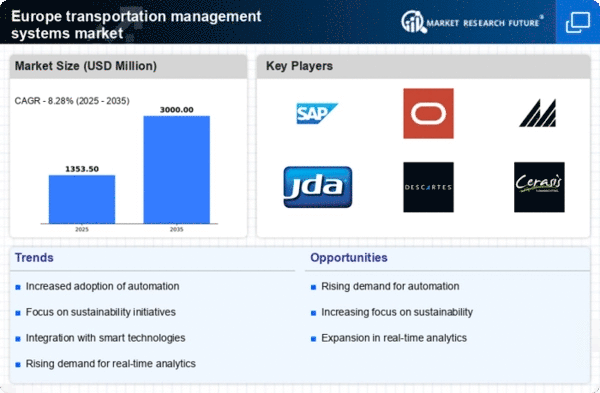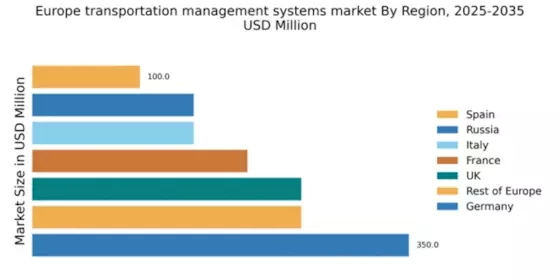Growing E-commerce Sector
The burgeoning e-commerce sector in Europe is significantly influencing the transportation management-systems market. With online retail sales projected to reach €500 billion by 2025, the demand for efficient logistics solutions is escalating. E-commerce businesses require robust transportation management systems to handle increased order volumes, ensure timely deliveries, and manage returns effectively. This shift is prompting logistics providers to adopt advanced technologies that can support the complexities of e-commerce logistics, including last-mile delivery solutions. As a result, the transportation management-systems market is poised for growth, driven by the need to cater to the evolving demands of the e-commerce landscape.
Integration of Advanced Analytics
The integration of advanced analytics into transportation management-systems is becoming a pivotal driver in Europe. Businesses are leveraging data analytics to gain insights into transportation patterns, customer preferences, and operational inefficiencies. This trend is underscored by the fact that companies utilizing data-driven decision-making can achieve up to 20% improvement in operational efficiency. The ability to analyze vast amounts of data allows organizations to make informed decisions regarding route planning, carrier selection, and load optimization. Consequently, the transportation management-systems market is likely to witness increased investment in analytics capabilities, enhancing overall performance and responsiveness.
Emphasis on Cost Reduction Strategies
In the current economic climate, European companies are placing a strong emphasis on cost reduction strategies, which is driving the transportation management-systems market. Organizations are seeking ways to minimize operational expenses while maintaining service quality. Transportation costs can represent a substantial portion of overall expenses, often exceeding 10% of total operational costs. By implementing effective transportation management systems, businesses can achieve significant savings through improved route planning, load consolidation, and carrier negotiations. This focus on cost efficiency is likely to propel the adoption of transportation management solutions, as companies strive to enhance profitability in a competitive market.
Increased Focus on Regulatory Compliance
The transportation management-systems market in Europe is also being shaped by an increased focus on regulatory compliance. As governments implement stricter regulations regarding emissions, safety standards, and data protection, companies are compelled to adopt systems that ensure compliance. For instance, the European Union's Green Deal aims to reduce greenhouse gas emissions by at least 55% by 2030, influencing logistics operations. Transportation management systems equipped with compliance features can help organizations navigate these regulations effectively, thereby mitigating risks and avoiding potential penalties. This growing need for compliance is likely to drive investment in advanced transportation management solutions.
Rising Demand for Supply Chain Efficiency
The transportation management-systems market in Europe is experiencing a notable surge in demand for enhanced supply chain efficiency. Companies are increasingly recognizing the need to optimize logistics operations to reduce costs and improve service levels. According to recent data, logistics costs account for approximately 10-15% of total sales in Europe, prompting businesses to invest in advanced transportation management systems. These systems facilitate real-time tracking, route optimization, and inventory management, which are essential for maintaining competitive advantage. As organizations strive to streamline their supply chains, the adoption of sophisticated transportation management solutions is likely to grow, thereby driving market expansion.


















